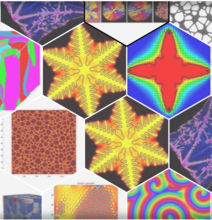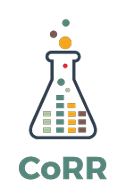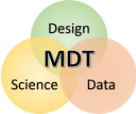Summary
Develop a materials innovation infrastructure for the design and discovery of inorganic materials to reduce the time and cost for deploying new materials into the marketplace. This requires building platforms (infrastructure) that enables data and tools to be easily shared and re-used; providing data that are discoverable, re-usable and transformable; and tools to generate needed data and models critical processing-structure-property relations.
Description
Phase Field Community Hub (PFHub) and Benchmarks

The Phase Field Community Hub provides a framework that supports phase field practitioners and code developers participating in an effort to improve quality assurance for phase field codes. The main thrust of this effort is the generation of a set of standardized benchmark problems along with a web framework for uploading and comparing benchmark results. The phase field method is well established and there are an assortment of code frameworks available for solving the associated PDEs. However, phase field research groups often develop codes in isolation and do not publish the code bases or do not support or distribute the code bases to the wider community. PFHub is a community effort spearheaded by CHiMaD and NIST to support the development of phase field codes and improve cross-collaboration between phase field code developers and practitioners by providing a website to compare simulation results using a standardized set of benchmark problems. For additional information on this project is available here.
JARVIS-ML

JARIVS-ML is a repository of machine learning (ML) models for scalar and image-based data. All the models for scalar quantities are trained and evaluated on the JARVIS-DFT data. Regression models are provided for properties such as bulk moduli, maximum infrared-active phonon modes, band gaps, refractive indices, and formation energies, while classification models cover physical quantities such as magnetic moments, piezoelectric coefficients, solar-cell efficiencies, and thermoelectric coefficients. JARVIS-ML is a part of the NIST-JARVIS project.
Cloud of Reproducible Records

The Cloud of Reproducible Records is a web platform for storing and viewing metadata and data associated with simulation records for reproducibility and beyond. It is designed as a gateway for execution management tools that aim in capturing software executions. The platform is composed of five components. A database component which stores the meta-data about the diverse entities in relationship within the platform. An api component which identifies and allow software management tools to interact with the platform. A cloud component dedicated for the frontend component access to the meta-data and records. A storage component that handles non meta-data files management. The GitHub repository for this application is available here.
Materials Design Toolkit (in-active project)

The Materials Design Toolkit integrate physics-based models with data stored in custom CDCS (Configurable Data Curation System) instances to create a seamless workflow between experiments and simulations. Within in this workflow the user is provided with machine learning functions to manage the model parameters and organized information. An optimizer is included to enable multicomponent objective materials design.

